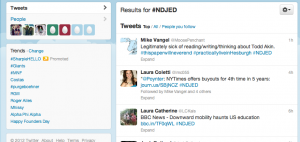So long for now
Posted on December 4, 2012 in GoodbiPadUsing the iPad this semester has revolutionized the way that I interact with social media, technology, the Internet and the news. I have become an informed citizen, motivated to stay updated on the important events happening in America and around the world. While I know the ambition to get involved with the news comes in part from my interest in the topics we discuss in class, I think the deciding factor was the iPad, which offered convenience and ease to consume news within my daily schedule. As David Carr said in the Page One documentary, we now have the ability to get updated on the news in the time it takes to wait in line for a cup of coffee. I use the iPad to check Twitter, Flipboard, and The New York Times regularly, if not constantly, throughout the day.
Not only has the news become an integral part of my daily routine, but the iPad has also changed the way that I do homework. Having the ability to open, download, read, annotate, save, and refer back to articles on a single device is great for an American Studies student, who has no shortage of reading assignments. I bring the iPad with me everywhere and love that everything I need is stored in one place.
Over the semester, I have been no stranger to other students making fun of me for having an iPad. The frequent response I get when students find out the University provided iPads to our class is: what? Why? Okay, it’s super convenient. That’s great. But why? Why did the Notre Dame sink money into giving the newest gadget to a group of journalism students? The undeniable fact is that iPads, or tablets in general, represent the future of how the public is going to obtain news. As we have studied this semester, print journalism is gradually fading out and tablets embody the technology that will replace it. Though many people remain sentimental and long for the old ways of doing things, as we saw with Kathleen Parkers anti-Twitter speech, technology is advancing quickly. As students with an interest in entering the journalism field, our futures depend on our ability to stay updated on the technology with which our stories will be made available to the public. I feel that, as journalists, we were given a great opportunity to embrace technology this semester; we created intellectual Twitter feeds, set up personal blogs, observed the way that other journalists embrace social media (Brian Stelter, anyone?) and familiarized ourselves with the growing world of online news. The opportunity to use the iPad put us ahead of the game in the journalism world. Because of the familiarity I have gained with the technology, I know I am better prepared to work as a journalist because I have a better handle on where the future of news is heading.
So, while the iPad has done great things to change my life this semester, it has also been hard at work changing the way that the media operates in America. Though it is sad to say goodbiPad, I know that this is not the last I will see of tablet technology, and the iPad will grow to be a widespread fixture in the lives of many Americans quite soon.








